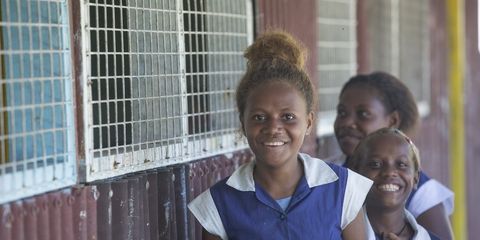Clean water for remote Solomon Islands community
Communities on the tiny island of Luaniua are working to reduce the effects of climate change and now have access to a new source of clean water.
There are no streams on the island and most of the water is obtained from wells. However, climate change is causing the wells to become contaminated with saltwater leaving it unfit for drinking.
Luaniua is one of 120 islands that form the Ontong Java, one of the largest atolls in the world. But rising sea levels and the growing population has brought new challenges to the islanders and the village chiefs are worried about their future.
“Water scarcity is an issue, especially during the prolonged dry season and we have no choice but to use water from the well,” explains Chief John Kehosu.
Clean water the top priority
Working together with the community, Plan International and SIDT identified the key issues affecting the island which home to around 3,000 people. Coastal erosion, depletion of marine resources and encroaching saltwater, which is affecting agriculture were all areas of concern, but the lack of safe drinking water was noted to be the number one priority.
Water scarcity is an issue, especially during the prolonged dry season.
To support the islanders, the Community-led Adaptation Pathways for the Solomon Islands (CAPSI) project was developed which provides grants to support community needs. The villagers chose to use their funds to increase the number of rainwater tanks to ensure there is enough water for drinking and cooking during the dry season.
“I attended the handover over of the rainwater tanks in Luaniua village. People were very happy, and they expressed their gratitude to SIDT and Plan International. There were chiefs, church elders, women, children and young people there,” says Chief John.
The tanks had to be transported to the village on a boat, along with all the project equipment needed to install them. Once installed, each 5,000 litre tank will catch runoff rainwater which will supply around 8 families with clean drinking water.
Raising awareness of COVID-19
The Plan International team also took COVID-19 awareness posters, pamphlets and radios to different parts of the island to keep the community up to date with current information on the coronavirus. We also conducted demonstrations of hand washing techniques and showed the community how to make simple tippy tap handwashing devices using locally available materials.
“I was with the team at the COVID-19 awareness raising sessions and they emphasised that handwashing is key to preventing the spread of COVID-19. The delivery of the rainwater tanks is timely. The community came together to complete the project,” Chief John concludes.
Categories: Emergencies


